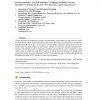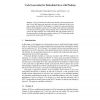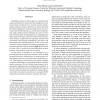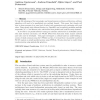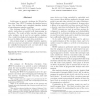365 search results - page 6 / 73 » Semi-automatic derivation of timing models for WCET analysis |
162
click to vote
DATE
2011
IEEE
14 years 3 months ago
2011
IEEE
Current processors are optimized for average case performance, often leading to a high worst-case execution time (WCET). Many architectural features that increase the average case...
102
click to vote
SEUS
2010
IEEE
14 years 10 months ago
2010
IEEE
Abstract. Code generation from models is the ultimate goal of model-based design. For real-time systems the generated code must be analyzable for the worstcase execution time (WCET...
128
click to vote
RTAS
2008
IEEE
15 years 6 months ago
2008
IEEE
Embedded systems are often subject to constraints that require determinism to ensure that task deadlines are met. Such systems are referred to as real-time systems. Schedulability...
108
click to vote
WCET
2010
14 years 9 months ago
2010
To take full advantage of the increasingly used shared-memory multicore architectures, software algorithms will need to be parallelized over multiple threads. This means that thre...
RTCSA
1999
IEEE
15 years 4 months ago
1999
IEEE
In this paper we present a technique for Worst-Case Execution Time WCET analysis for pipelined processors. Our technique uses a standard simulator instead of special-purpose pipel...
